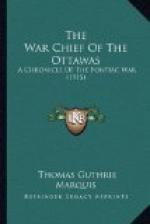French missionaries were the first white men to settle
in the populous Huron country near Lake Simcoe.
A missionary was the first European to catch a glimpse
of Georgian Bay, and a missionary was probably the
first of the French race to launch his canoe on the
lordly Mississippi. As a father the priest watched
over his wilderness flock; while the French traders
fraternized with the red men, and often mated with
dusky beauties. Many French traders, according
to Sir William Johnson—a good authority,
of whom we shall learn more later-were ’gentlemen
in manners, character, and dress,’ and they
treated the natives kindly. At the great centres
of trade—Montreal, Three Rivers, and Quebec—the
chiefs were royally received with roll of drum and
salute of guns. The governor himself —the
‘Big Mountain,’ as they called him—would
extend to them a welcoming hand and take part in their
feastings and councils. At the inland trading-posts
the Indians were given goods for their winter hunts
on credit and loaded with presents by the officials.
To such an extent did the custom of giving presents
prevail that it became a heavy tax on the treasury
of France, insignificant, however, compared with the
alternative of keeping in the hinterland an armed
force. The Indians, too, had fought side by side
with the French in many notable engagements.
They had aided Montcalm, and had assisted in such triumphs
as the defeat of Braddock. They were not only
friends of the French; they were sword companions.
The British colonists could not, of course, entertain
friendly feelings towards the tribes which sided with
their enemies and often devastated their homes and
murdered their people. But it must be admitted
that, from the first, the British in America were
far behind the French in christianlike conduct towards
the native races. The colonial traders generally
despised the Indians and treated them as of commercial
value only, as gatherers of pelts, and held their
lives in little more esteem than the lives of the
animals that yielded the pelts. The missionary
zeal of New England, compared with that of New France,
was exceedingly mild. Rum was a leading article
of trade. The Indians were often cheated out of
their furs; in some instances they were slain and their
packs stolen. Sir William Johnson described the
British traders as ’men of no zeal or capacity:
men who even sacrifice the credit of the nation to
the basest purposes.’ There were exceptions,
of course, in such men as Alexander Henry and Johnson
himself, who, besides being a wise official and a
successful military commander, was one of the leading
traders.




